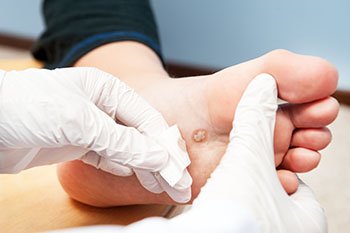Connect With Us
Blog

Metatarsalgia refers to pain and inflammation in the ball of the foot, often caused by excessive pressure or impact. Common causes include high-impact sports, foot injuries, wearing shoes with inadequate support, bunions, hammertoes, or arthritis. Conditions like flat feet or high arches can also shift weight unevenly, adding stress to the metatarsal bones. Symptoms include a sharp, aching, or burning pain in the ball of the foot, often worsened by standing, walking, or running. It may feel like you are stepping on a pebble or there is a bruise on the sole of your foot. Swelling, numbness, or tingling may also occur. A podiatrist can diagnose metatarsalgia through physical exams, imaging, and gait analysis. Treatment may involve custom orthotics, footwear changes, and targeted exercises to relieve pressure and restore foot function. If you have foot pain, it is suggested that you schedule an appointment with a podiatrist for a diagnosis and appropriate treatment.
Foot Pain
Foot pain can be extremely painful and debilitating. If you have a foot pain, consult with one of our podiatrists from Southwest Podiatry. Our doctors will assess your condition and provide you with quality foot and ankle treatment.
Causes
Foot pain is a very broad condition that could be caused by one or more ailments. The most common include:
- Bunions
- Hammertoes
- Plantar Fasciitis
- Bone Spurs
- Corns
- Tarsal Tunnel Syndrome
- Ingrown Toenails
- Arthritis (such as Gout, Rheumatoid, and Osteoarthritis)
- Flat Feet
- Injury (from stress fractures, broken toe, foot, ankle, Achilles tendon ruptures, and sprains)
- And more
Diagnosis
To figure out the cause of foot pain, podiatrists utilize several different methods. This can range from simple visual inspections and sensation tests to X-rays and MRI scans. Prior medical history, family medical history, and any recent physical traumatic events will all be taken into consideration for a proper diagnosis.
Treatment
Treatment depends upon the cause of the foot pain. Whether it is resting, staying off the foot, or having surgery; podiatrists have a number of treatment options available for foot pain.
If you have any questions, please feel free to contact our offices located in Dallas, and Carrollton, TX . We offer the newest diagnostic and treatment technologies for all your foot care needs.

Chronic tendon injuries in the foot and ankle happen when a tendon becomes irritated or damaged over time, often due to overuse, poor foot mechanics, or past injuries that did not fully heal. Examples include Achilles tendinopathy and posterior tibial tendon dysfunction. These conditions can cause long-lasting pain, stiffness and weakness, especially during activity. Treatment focuses on reducing stress on the tendon and supporting healing. This may involve rest, custom orthotics, stretching and strengthening exercises, targeted exercises, or anti-inflammatory treatments. In more severe cases, advanced therapies or surgery may be considered. Chronic tendon injuries do not usually improve on their own and can worsen if left untreated. If you have ongoing foot or ankle pain that seems to flare up during movement or does not go away with rest, it is suggested that you see a podiatrist for proper evaluation and care.
Achilles tendon injuries need immediate attention to avoid future complications. If you have any concerns, contact one of our podiatrists of Southwest Podiatry. Our doctors can provide the care you need to keep you pain-free and on your feet.
What Is the Achilles Tendon?
The Achilles tendon is a tendon that connects the lower leg muscles and calf to the heel of the foot. It is the strongest tendon in the human body and is essential for making movement possible. Because this tendon is such an integral part of the body, any injuries to it can create immense difficulties and should immediately be presented to a doctor.
What Are the Symptoms of an Achilles Tendon Injury?
There are various types of injuries that can affect the Achilles tendon. The two most common injuries are Achilles tendinitis and ruptures of the tendon.
Achilles Tendinitis Symptoms
- Inflammation
- Dull to severe pain
- Increased blood flow to the tendon
- Thickening of the tendon
Rupture Symptoms
- Extreme pain and swelling in the foot
- Total immobility
Treatment and Prevention
Achilles tendon injuries are diagnosed by a thorough physical evaluation, which can include an MRI. Treatment involves rest, physical therapy, and in some cases, surgery. However, various preventative measures can be taken to avoid these injuries, such as:
- Thorough stretching of the tendon before and after exercise
- Strengthening exercises like calf raises, squats, leg curls, leg extensions, leg raises, lunges, and leg presses
If you have any questions please feel free to contact our offices located in Dallas, and Carrollton, TX . We offer the newest diagnostic tools and technology to treat your foot and ankle needs.

Plantar warts are growths that appear on the soles of the feet, caused by the human papillomavirus, or HPV. They often develop in areas of pressure, like the heel or ball of the foot, and can sometimes combine to form a condition known as mosaic warts. Mosaic warts are clusters of multiple warts that spread out across a larger area, creating a patchy, rough surface. These warts can cause pain, especially when walking or standing for long periods. They often look like small, rough bumps with black dots in the center, which are blood vessels. The area susrrounding the wart may become hardened and calloused. A podiatrist can diagnose and treat plantar warts through various methods, including cryotherapy or freezing, laser treatment, and minor surgery. They may also provide topical treatments and advice on preventing the spread of the virus. If you have this condition, it is suggested that you schedule an appointment with a podiatrist for appropriate care.
Plantar warts can be very uncomfortable. If you need your feet checked, contact one of our podiatrists from Southwest Podiatry. Our doctors will assist you with all of your foot and ankle needs.
About Plantar Warts
Plantar warts are the result of HPV, or human papillomavirus, getting into open wounds on the feet. They are mostly found on the heels or balls of the feet.
While plantar warts are generally harmless, those experiencing excessive pain or those suffering from diabetes or a compromised immune system require immediate medical care. Plantar warts are easily diagnosed, usually through scraping off a bit of rough skin or by getting a biopsy.
Symptoms
- Lesions on the bottom of your feet, usually rough and grainy
- Hard or thick callused spots
- Wart seeds, which are small clotted blood vessels that look like little black spots
- Pain, discomfort, or tenderness of your feet when walking or standing
Treatment
- Freezing
- Electric tool removal
- Laser Treatment
- Topical Creams (prescription only)
- Over-the-counter medications
To help prevent developing plantar warts, avoid walking barefoot over abrasive surfaces that can cause cuts or wounds for HPV to get into. Avoiding direct contact with other warts, as well as not picking or rubbing existing warts, can help prevent the further spread of plantar warts. However, if you think you have developed plantar warts, speak to your podiatrist. He or she can diagnose the warts on your feet and recommend the appropriate treatment options.
If you have any questions please feel free to contact our offices located in Dallas, and Carrollton, TX . We offer the newest diagnostic and treatment technologies for all your foot and ankle needs.

